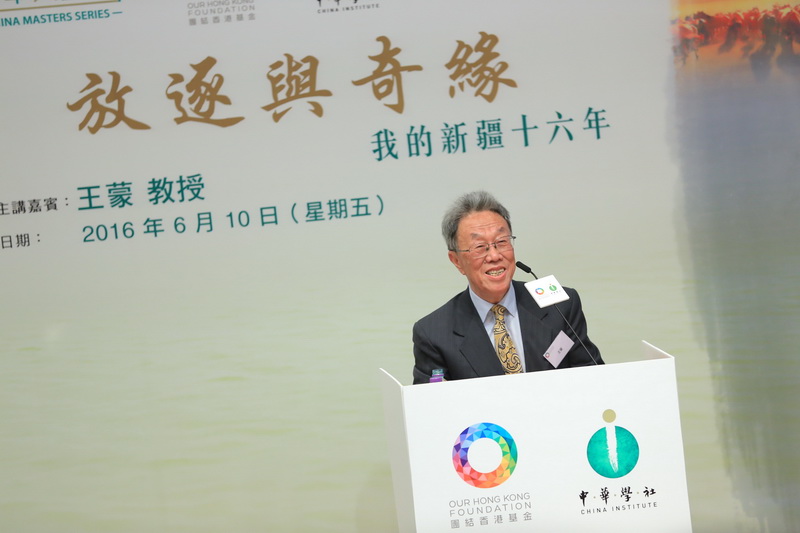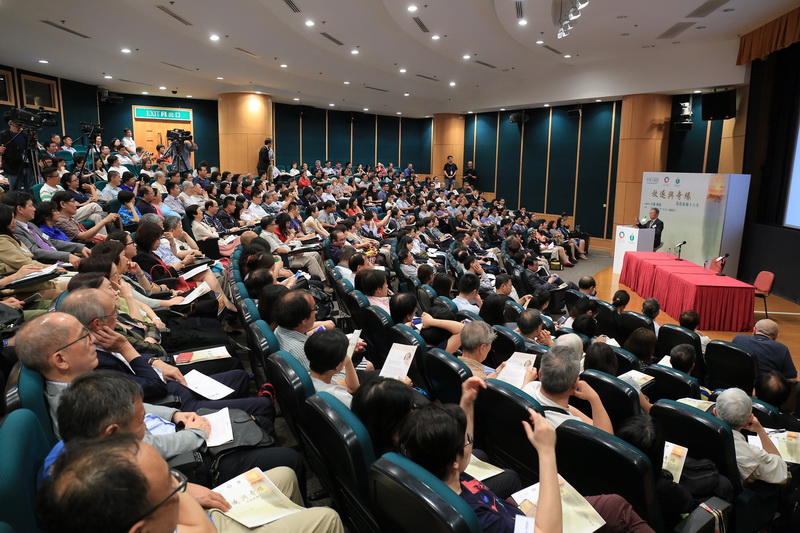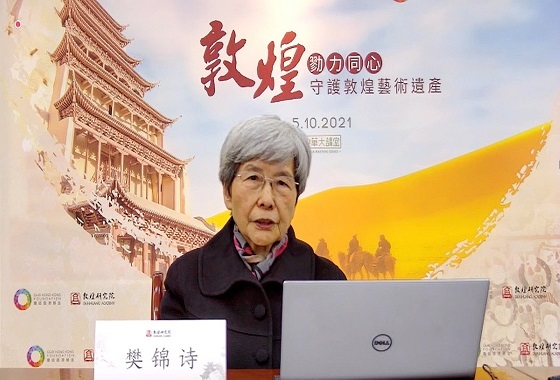Renowned Author Wang Meng Recalls Exile in Xinjiang, Inspirations for Writing Gained from Life There
(Hong Kong, 10 June 2016) Literature won’t be replaced by other forms of art as the former embraces the authors’ abilities of language, logical thinking, and synthesizing and analyzing, while the latter are just various extensions of literature, standing for another world that derives from that of literature, declared Mr Wang Meng, Honorary Chairman of China Writers Association and former Minister of Culture in China.
Mr Wang asserted his belief during a talk entitled “The People and Events in My 16-Year Exile in Xinjiang”, which he gave today at Hong Kong Central Library at the invitation of China Institute, Our Hong Kong Foundation. The talk is the latest event in the China Masters Series presented by the hosting organization.
Prior to the talk, Mr Wang attended a group discussion this morning that focused on Chinese-language literature in Hong Kong, talking about the topic with local writers and leaders of the literary and educational circles. The participants shared their views and insights about reading and writing of literature.
In his talk, Mr Wang said the Xinjiang exile served to “baptized” him with refreshing experiences in his life, and also to make a great impact on him as a writer. “From the perspective of literary writing, without a Wang Meng in those years there couldn’t have been the Wang Meng later on,” he said with emphasis.
For example, Scenery on This Side, a novel he wrote in exile, won him the Mao Dun Literature Prize in 2015, one of the topmost hnours for writers in China. In addition, the people and events in the exile later prompted him to produce a series of essays and reportage pieces, such as those collected in Spring All Over Turpan and The Fiery Flags.

The 16 years in Xinjiang, Mr Wang recalled, was an unhappy period in his life, yet he managed to find some happy days while living there. The multi-ethnic society with various cultures and religious beliefs turned out to be a boon to him, making him stronger and more open-minded, imbued with zeal and inspiration.
The discussion about Chinese-language literature, which preceded the public talk, brought up the trend of reading on electronic devices among young people today. Mr Wang believed that it would not impede the progress of literature or subvert the literary tradition. Rather, he expressed his support for “three-dimensionizing” of literature, namely making literature develop beyond the printed pages.
“We are honoured to have invited Mr Wang Meng, a leading representative of China’s literary circles, to come and give this talk, interacting with Hong Kong people,” said Mrs Eva Cheng, Executive Director of OHKF. “We hope Mr Wang’s participation in our event will boost the ties between Hong Kong and the mainland, help promote a culture of literary creation here so that Chinese-language literature will be passed on well to the younger generations.”
“We will go on hosting similar talks and forums to help people learn more about Chinese culture and how China is making progress,” said Professor Pei-kai Cheng, Director of China Institute. “The talk today is the fifth of such events that we have hosted. This year happens to be the 400th anniversary of the departure of William Shakespeare and Tang Xianzu, the great Chinese playwright of the Ming Dynasty. So we are going to present a forum on 3 July in hour of the two master playwrights. We hope the speakers invited from Hong Kong and abroad and our young aspirant writers will have a nice gathering and talk about literature together,” he added.

About Mr Wang Meng
Mr Wang Meng is currently Honorary Chairman of China Writers Association. He once served as China's Minister of Culture, head of a committee on literature and related fields under the National People’s Political Consultative Congress, Editor-in-Chief of People’s Literature, and President of Chinese National Academy of Arts.
Mr Wang Meng has published over 60 books since 1955, his works having been translated into more than 20 languages and published abroad, earning him a great fame across the world. For example, Scenery on This Side, a novel he wrote in exile, won him the Mao Dun Literature Prize in 2015, one of the topmost honors for writers in China. In 1987 Mr Wang earned prestigious literary awards in Italy and Japan respectively.



